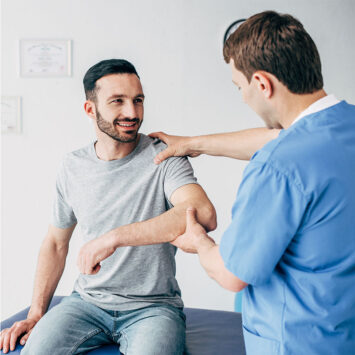For those aged over 65 years, falling down the stairs, tripping into a coffee table, or simply stumbling over slippers can have incredibly painful and devastating impacts on a person’s life, often reducing their ability to stay mobile, care for themselves and live independently within their own home.
The good news is that falls are not an inevitable part of ageing – on the contrary – most falls are highly preventable. The key is to this is working with a qualified podiatrist or physiotherapist as early as possible, who can help to put in place a range of strategies, tools and modifications to reduce your chance of falls, improve your recovery, and allow you to keep living confidently within your own home for years to come.
Here’s a look at how physiotherapists and podiatrists can help you and your loved ones with fall prevention, and how you can access these services regardless of your financial situation.
Falls In New Zealand: The Harsh Reality
We rely on our bodies to do so much for us throughout each day, often without giving our movements a second thought. So, we often don’t think twice about relying on it to keep us from accidentally tripping or falling – until an accident happens. In New Zealand, falls are the single most common cause of injury in older adults. Every year, one in three people over 65 injures themselves in a fall, rising to one in two for those aged 80 years or older. Sadly, up to 20% of these falls result in significant injury, hospitalisation or even death – and the most common place this happens is in the comfort of our own home.
Older adults that are hospitalised with strains or hip fractures may require increased care, as complex injuries and ongoing disability can mean that they are no longer able to care for themselves, prepare meals or complete everyday tasks on their own. Falls can also deflate a person’s confidence and emotional wellbeing, whether they cause injury or not. Simply fearing a fall can make you more prone to depression, anxiety and isolation as you withdraw from the outside world and stay home, avoiding activities and social connections.
Why Are Falls More Common With Age?
Falls are more common as you get older due to a range of physical factors related to the ageing process, as well as environmental factors. Physical factors within a person’s body can include:
- Changes in balance, coordination and walking
- Reduced reflexes
- Other existing injuries
- Medical conditions or diseases that may alter proprioception (the body’s ability to perceive its own position in space)
- Vision changes
- Loss of muscle strength. Muscle weakness in your feet and legs can increase your likelihood of having a fall by over four times
Environmental factors can include:
- Hazards around the home environment.
- Lighting in your home – harsh sunlight, shadows, or dim lighting
- Improper fitting, heavy or unsupportive footwear.
- Side effects from medications. Taking benzodiazepines, for example, is associated with an increase of as much as 44% in the risk of hip fracture and night falls in older adults
Podiatry And Physiotherapy Are Proven To Help With Falls
The good news is that podiatry and physiotherapy are proven to help prevent falls., Studies have found that effective fall prevention in older adults needs three key elements: exercise, education and home or environmental modifications. Podiatrists and physiotherapists help those who are worried about falls, or that have had a previous fall, to reduce their fall risk by:
- Identifying muscle weakness, tightness, posture and balance problems as well as other musculoskeletal issues, then creating exercise and rehab plans to address these factors to help regain mobility and stability
- Working with you to make the right footwear selections for both inside and outside of the home to minimise falls risk
- Suggesting wearable supports, like splints or braces, to support your stability and movement. These may be general braces that are already in stock, or may be custom-made for you if you have problems like drop foot where a tailored device may give the best results
- Using custom foot orthotics to improve stability, foot function, and to offload any painful or stiff joints that may be hindering your mobility
- Gait retraining
- Referring you to other health professionals, including occupational therapists for a home assessment to remove tripping hazards, alter lighting or fit extra handlebars, and optometrists to assess new vision changes
Removing The Cost Barrier From Physiotherapy and Podiatry Appointments
While all adults in New Zealand deserve the right to get help to reduce their fall risk, paying for an appointment with a physiotherapist or podiatrist can put people off from seeking the treatment they need, especially if they don’t have the money available in their bank account straight away. Delaying getting support for fall prevention leaves you vulnerable to injury and reduced mobility, which can affect your ability to care for yourself and continue to live independently in your own home.
This is where New Zealand’s leading health-focused Buy Now, Pay Later (BNPL) platform, HealthNow, has stepped in to bridge this gap at no cost to health consumers. Your total appointment cost, including the cost of any products you purchase, is spread over up to six weeks, leaving your upfront cost at only a fraction of what it would otherwise be.
Unlike other BNPL services that charge fees or interest, which further disadvantages those that are trying to be proactive about their health, HealthNow remains completely free to users, and physiotherapy and podiatry clinics still get paid in full by HealthNow on the day of the visit. This win-win platform is transforming healthcare access for New Zealanders, enabling them to get the best outcomes for their health by not being forced to delay their care.
To start using HealthNow and claim your $10 credit when you first create an account to use on any health service, sign up here. You can also check out HealthNow’s full benefits and features, including a health wallet to store funds set aside for health services that can be contributed to by others including your employer.
References:
- https://www.acc.co.nz/newsroom/stories/whats-tripping-us-up-how-kiwis-are-falling-over/
- https://www.safecommunities.org.nz/application/files/3114/8115/6965/Fact_Sheet_8.pdf
- https://pubmed.ncbi.nlm.nih.gov/10855607/
- https://www.bmj.com/content/342/bmj.d3052
- https://www.researchgate.net/publication/343161794_Effect_of_physiotherapy_in_Fall_prevention
- https://www.euro.who.int/__data/assets/pdf_file/0018/74700/E82552.pdf








